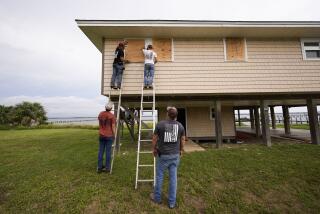Officials on Alert for a Different Sort of Terrorist
Five years after the Sept. 11 attacks, federal law enforcement and intelligence officials are struggling to adapt to an increasingly worrisome threat: homegrown terrorists both in the U.S. and abroad who are not directly connected to Al Qaeda or other recognized terrorist groups.
Their concern is driven by recent arrests of suspected terrorists accused of plotting mayhem in countries including Germany and Denmark, as well as an alleged Canadian-based plot involving American citizens and a separate alleged plot centered in Torrance.
Though they have not discounted the continuing grave threat that even a splintered Al Qaeda network poses, U.S. officials said the enemy from within was posing a new and challenging danger.
U.S. Atty. Gen. Alberto R. Gonzales and FBI Director Robert S. Mueller III addressed the subject in interviews this week marking the fifth anniversary of the attacks in New York and near Washington.
“When you are talking about people that live and work in neighborhoods in this country that receive training over the Internet, that are radicalized over the Internet ... it presents different challenges for the law enforcement community to try to identify them,” Gonzales said Tuesday. “What we are seeing is a rising threat of homegrown terrorists ... not just in this country but all over the world.”
Gonzales addressed the issue again Thursday during a speech in New York in which he called for greater cooperation between federal authorities and state and local crime fighters. He said terrorist groups such as Al Qaeda were “finding disaffected souls in neighborhoods, mosques, prisons and universities all over the world, including our own backyards.”
Mueller said Wednesday in a briefing with reporters that the bureau had “certainly several hundred” individuals under investigation in the U.S. as part of terrorism-related intelligence and criminal probes. He said the bureau was also devoting more resources to understanding the “radicalization” process -- how people come to embrace extremist views.
“One cannot dismiss the potency still of Al Qaeda to undertake attacks. But by the same token, there also are those groups of individuals, as we have seen in various countries, that are motivated by radical Islamist ideology to undertake actions on their own,” Mueller said.
Among other recent cases, he cited the arrests in Denmark this week of nine men -- including an ethnic Dane -- suspected of gathering explosives for a terrorist plot.
The FBI’s deputy director, John S. Pistole, said during the same briefing that most of the subjects of U.S. investigations were being examined for their financial ties to terrorist groups rather than as actual operatives. “These are not bomb-throwers for the most part,” Pistole said. “These are people who are out there raising money.”
In a way, the statements show how concern about domestic threats has changed since the immediate aftermath of Sept. 11, when officials were focused on the possibility of a second round of attacks on the homeland.
When that did not materialize, “our attention on this issue receded,” said Bruce Hoffman, a terrorism expert at Georgetown University’s School of Foreign Service. “We were lulled into complacency.”
One major reason, Hoffman said, was the universality with which American Muslims condemned the attacks. Leaders of many mosques around the country began actively cooperating with investigators.
But that has only driven terrorist wannabes to find other places to assemble and conspire. The July 2005 London subway bombings showed how terrorists had become more likely to recruit at gyms or health clubs or bookstores -- places that law enforcement officials were not customarily targeting.
The ability to reach potential converts over the Internet is also enabling terrorists in countries thought to be immune from attack, experts said. For example, until the August arrests in Berlin of two Lebanese men accused of plotting to bomb two trains, many Germans did not consider their country a high-profile target in part because of their government’s opposition to the Iraq war.
The recruiting of homegrown converts is also changing the traditional profile of suspects.
“I think what really disturbs [U.S. officials] is to see growing numbers of people who do not fit any profiling model -- they are not from the Middle East; they are not converted to any religion,” said Evan Kohlmann, a terrorism expert who has advised the Justice Department in several terrorism prosecutions. “It is like a stealth convert -- someone who radicalizes on their own. It is very difficult to find someone like that.”
More to Read
Sign up for Essential California
The most important California stories and recommendations in your inbox every morning.
You may occasionally receive promotional content from the Los Angeles Times.










